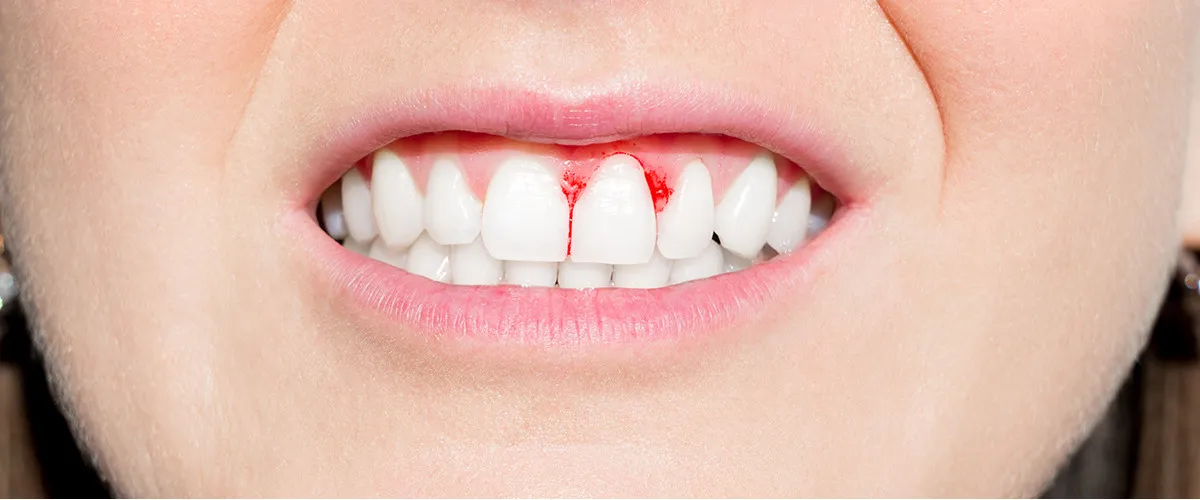
You spit. There’s red in the sink. You tell yourself it’s nothing. Maybe you brushed too hard. Maybe your gums are just sensitive. You move on. But the bleeding returns. Not every day, but often enough. It becomes part of the routine you try not to notice.
It doesn’t hurt. That’s the strange part. No throbbing. No sharp pain. Just blood. Quiet and persistent. And because it doesn’t scream, you ignore it. Until ignoring it stops working.
Gums don’t bleed without a reason
Healthy gums don’t bleed. That’s the truth. Not from brushing. Not from flossing. Not from chewing. When they do, it’s a sign. Of inflammation. Of buildup. Of something starting beneath the surface.
Plaque is soft at first. Then it hardens into tartar. It creeps below the gumline. The body reacts. The gums swell. They redden. And when touched, they bleed. Not because they’re weak—but because they’re trying to fight.
Gingivitis is where it often begins
Gingivitis is early gum disease. It doesn’t always hurt. It doesn’t always cause recession. But it causes bleeding. Swelling. Sometimes bad breath. Sometimes a taste you can’t explain. It’s reversible, but only if caught early.
Brush gently, but thoroughly. Floss daily. Rinse if needed. But most importantly—notice the signs. Gingivitis ignored doesn’t stay quiet. It grows into something else.
When it worsens, it becomes periodontitis
This stage doesn’t stay on the surface. The gums pull away. Pockets form. Bacteria spreads deeper. Bone begins to break down. Teeth feel looser. Not all at once. But slowly. Quietly.
Bleeding continues. But now there’s discomfort. Maybe even pain. Chewing becomes different. The gums don’t just bleed—they ache. They recede. And the damage becomes harder to undo.
Some causes come from beyond the mouth
Hormonal changes can make gums bleed. Pregnancy. Menopause. Even birth control. The gums become more sensitive. They react more. They swell faster. Even light brushing may trigger bleeding.
Certain medications do it too. Blood thinners. Some heart medications. Some antidepressants. They alter the way gums respond. That doesn’t mean stop taking them. It means pay more attention.
Vitamin deficiencies don’t always show clearly
A lack of vitamin C weakens the tissue. Makes it fragile. More likely to bleed. Vitamin K plays a role too—helping blood clot. Without it, even a small touch might lead to red on the toothbrush.
These aren’t common, but they happen. Especially with restrictive diets. Or chronic illness. The gums notice what the body lacks, even before you do.
Smoking hides the signs instead of stopping them
Smokers bleed less—but not because their gums are healthier. Smoking reduces blood flow. It numbs the signs. So problems grow unnoticed. And when symptoms finally show, the damage is often worse.
Quitting won’t fix everything. But it removes a major barrier to healing. The gums begin to feel again. They bleed more at first. Then they start to recover.
The fix isn’t just one appointment
A professional cleaning helps. It removes what brushing can’t. But it’s the beginning, not the end. The bleeding may continue for a while. That doesn’t mean it failed. It means healing is happening.
You go home. You brush differently. Floss every day. Maybe use a medicated rinse. Maybe come back in a few weeks. It’s not instant. But it changes.
Surgery is rare, but sometimes necessary
If the pockets are too deep, surgery may be needed. To clean beneath the gums. To reshape the tissue. To remove infection. It sounds invasive, but it helps save teeth. And stop the bleeding at its root.
Some procedures are minor. Others more involved. But they aim to stop progression. To keep what’s still healthy. And give the gums a chance to reconnect.
Daily care is still the most powerful tool
You don’t need fancy tools. Or extreme pressure. Just consistency. Twice a day. Every day. Flossing, even when it’s annoying. Brushing, even when you’re tired. That’s what makes the bleeding stop.
Mouthwash can help. So can soft brushes. But nothing replaces showing up for your gums each day. They bleed when they’re forgotten. They heal when they’re seen.
